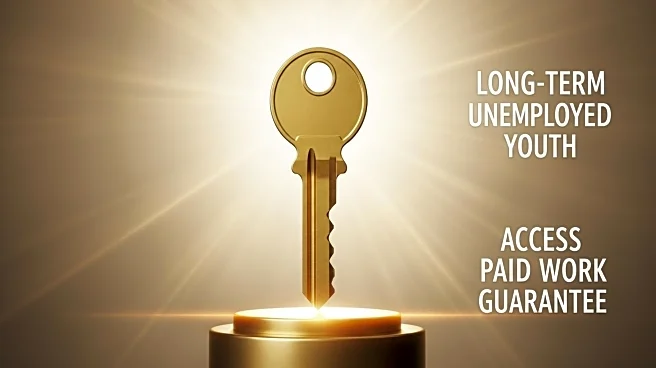What's Happening?
Rachel Reeves, the Chancellor, is set to announce a new initiative aimed at abolishing long-term youth unemployment. The plan guarantees paid work placements for young people who have been unemployed or out of education for 18 months. Those who refuse the offer without a reasonable excuse may face sanctions, including the loss of benefits. This initiative builds on a previous 'youth guarantee' that provided access to apprenticeships and training for 18 to 21-year-olds. The scheme will collaborate with private companies, which are expected to cover part of the wages for job placements. The cost of the program will be funded from existing budgets, with full details to be revealed in the upcoming November Budget.
Why It's Important?
The initiative is significant as it addresses the issue of long-term youth unemployment, which affects approximately 948,000 young people in the UK. By providing guaranteed work placements, the program aims to equip young individuals with the skills necessary for full-time employment, potentially reducing unemployment rates and boosting economic growth. The Federation of Small Businesses has welcomed the announcement, highlighting the importance of reallocating funds from ineffective employment programs to this new scheme. However, there are concerns about whether businesses can accommodate the influx of new workers amidst rising costs and falling job vacancies.
What's Next?
The full details of the initiative will be outlined in the November Budget, where the Chancellor will present the government's tax and spending plans. Economists have warned that tax increases or spending cuts may be necessary to meet borrowing rules. The success of the program will depend on effective collaboration with businesses and addressing challenges such as health-related unemployment and pressures on small businesses.
Beyond the Headlines
The initiative reflects a broader societal shift towards valuing contribution and fair reward, as emphasized by Rachel Reeves. It aligns with the idea that individuals should see tangible benefits from their contributions to the system. The program also highlights the government's commitment to creating opportunities for young people, regardless of their background, and fostering a society based on opportunity and contribution.











